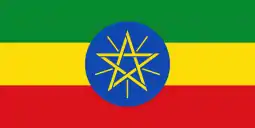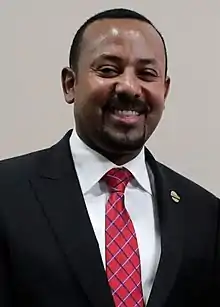Prime Minister of Ethiopia
The Prime Minister of Ethiopia is the head of government and chief executive of Ethiopia. The Prime Minister is the most powerful figure in Ethiopian politics and commander in chief of the Ethiopian Armed Forces. The official residence of the prime minister, is Menelik Palace in Addis Ababa. Abiy Ahmed Ali (PhD) is the fourth Prime Minister of the Federal Democratic Republic of Ethiopia[2] Prime Minister since the new constitution formed the Federal Democratic Republic of Ethiopia.
| Prime Minister of the Federal Democratic Republic of Ethiopia የኢፌዲሪ ጠቅላይ ሚኒስትር | |
|---|---|
 Emblem | |
 Flag of Ethiopia | |
| Residence | Menelik Palace |
| Appointer | President of Ethiopia |
| Term length | No term limit |
| Formation | 1909 (Chief Minister) 1943 (Prime Minister) |
| Deputy | Demeke Mekonnen |
| Salary | 3,600 USD annually[1] |
| Website | Prime Minister Office - Ethiopia |
 |
|---|
| This article is part of a series on the politics and government of Ethiopia |
Ethiopia is a parliamentary republic with the President as head of state and the Prime Minister as head of government. However, unlike in most parliamentary republics, the 1995 Constitution of Ethiopia explicitly vests executive power in the Council of Ministers and names the Prime Minister as chief executive, with the President limited to an almost entirely ceremonial role.
The Prime Minister is elected from the members of the House of Representatives.[3] The nominee then presents a government platform and must receive a vote of confidence in order to become prime minister. In practice, the Prime Minister is usually the leader of the largest party in the House of Peoples' Representatives.
Origins and history
The heads of government of Ethiopia have been Chief Ministers (1909–1943), and then Prime Ministers (1943–present). Since 1995 Ethiopia follows a Parliamentary system of government.
The Prime Minister's position is stronger on paper than his counterparts in other parliamentary systems fashioned after the Westminster system. In most other parliamentary systems, the head of state or his or her official representative (i.e., the monarch or president or governor-general) is nominal chief executive, but in practice is bound to act on the advice of the prime minister. Thus, the head of state de facto holds a purely ceremonial position, while the prime minister is the actual head of government, chief executive, and leading political figure. In Ethiopia, however, the Prime Minister is both de jure and de facto chief executive.
The prime minister is expected to become a member of the House of Peoples' Representatives within six months of beginning their tenure, if they are not a member already. The prime minister is expected to work with other ministers to ensure the passage of bills through the legislature.
Role and power of the prime minister
After each election, President of Ethiopia invites the leader of the majority party or the party with the highest number of seats in the House of Peoples' Representatives to form a government at the federal level and exercise its powers. In practice the prime minister nominates the cabinet ministers.
The prime minister is also the commander-in-chief of the Ethiopian National Defense Force.
The prime minister, in consultation with the Cabinet, schedules and attends the sessions of the Houses of Parliament and is required to answer the question from the Members of Parliament to them as the in-charge of the portfolios in the capacity as Prime Minister of Ethiopia.
The prime minister represents the country in various delegations, high level meetings and international organisations that require the attendance of the highest government office.
Security
The bodyguards of the Ethiopian Prime Minister are equipped with the TAR-21 assault rifle.[4][5]
See also
- Emperor of Ethiopia
- List of Emperors of Ethiopia
- President of Ethiopia
- List of Presidents of Ethiopia
- List of heads of government of Ethiopia
- Rulers of Ethiopia
References
- Today, Latest Africa News, Headlines & Top Stories (5 November 2018). "African Leaders With The Lowest Salaries". Archived from the original on 22 March 2019.
- "Prime Minister". The Federal Democratic Republic of Ethiopia’s Office of the Prime Minister. Retrieved 6 June 2019.
H.E. Abiy Ahmed Ali (PhD) is the fourth Prime Minister of the Federal Democratic Republic of Ethiopia
- Article 73(1) Constitution of the Federal Republic of Ethiopia
- Archived February 8, 2015, at the Wayback Machine
- "Ethiopia's Meles urges recognition of poll win". ethiomedia.com. 2010-05-25. Retrieved 2015-08-25.
External links
![]() Media related to Prime ministers of Ethiopia at Wikimedia Commons
Media related to Prime ministers of Ethiopia at Wikimedia Commons
